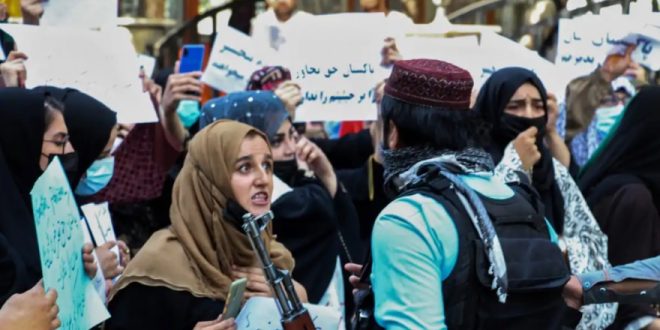Latest News
- Mangal Donates 500-Bed Hostel to Wudil University After Receiving Honorary Doctorate
- Ministan Sadarwa Ya Yi Alkawarin Gina Dakin Kirkira a Katsina, Ya Yaba da Cigaban KATDICT
- Radda Joins Northern Governors in Kaduna to Tackle Insecurity, Economic Setbacks Traditional rulers, regional leaders strategize on common challenges
UN edging closer to recognizing gender apartheid in Afghanistan

KABUL – In a significant move to support human rights, the United Nations convened a session to officially recognize “gender apartheid” in Afghanistan. This historic session, held on Friday, occurred alongside the 88th UN General Assembly and was attended by representatives from various nations.
Prominent figures addressing the session included Richard Bennett, the UN Special Rapporteur for Afghanistan; Rina Amiri, the U.S. Special Representative for Afghan Women’s Rights; Adela Raz, former Afghan representative to the UN; Melanie Weaver, the U.S. Deputy Representative for Global Affairs, and several other diplomats.
During this session, the speakers drew attention to the dire situation in Afghanistan, characterizing it as a stark example of “gender apartheid.” They issued a compelling call for concrete actions to put an end to this distressing state of affairs.
Richard Bennett, in his impassioned speech, pointed out that the “global community has betrayed women in Afghanistan.” He emphasized that addressing the current situation requires more than just condemnations and expressions of sympathy; practical steps are imperative.
It’s noteworthy that women’s rights advocates have been actively campaigning for the official recognition of “gender apartheid” in Afghanistan, particularly since the resurgence of the Taliban. Recent events have seen hunger strikes staged by girls in European countries and Pakistan in solidarity with Afghan women.
Notable hunger strikes include Tamana Zaryab Paryany and her supporters in Cologne, Germany, Mina Rafiq’s silent hunger strike in Norway, Mohra Fabi’s hunger strike in Sweden, and a collective hunger strike by women’s rights activists in Islamabad, Pakistan. Their unified demand from the global community is to acknowledge the existence of “gender apartheid” in Afghanistan.
These protests have prompted a United Nations-hosted meeting, bringing the issue of gender apartheid in Afghanistan under scrutiny. Richard Bennett, while assessing the plight of women in Afghanistan, also called for the preparation of a comprehensive report to address technical questions that may arise in the UN Security Council regarding this pressing concern.
Over the past two years, Afghanistan has witnessed a disturbing gender gap, exacerbated by the Taliban’s return to power. This gap has resulted in unprecedented disparities in access to resources, opportunities, and fundamental social, economic, and political rights.
The “Window of Hope Women’s Movement of Afghanistan,” a group of courageous women, has been at the forefront of the campaign to recognize “gender apartheid.” They emphasize the pivotal role of the United Nations and human rights organizations in breaking their silence and taking concrete action to combat this grave injustice.
Furthermore, the UN Human Rights Council’s report on the situation of women in Afghanistan unequivocally confirms the existence of “gender apartheid” and highlights the ongoing issue of “sexual abuse and harassment” as a crime against humanity. The occurrence of these crimes in Afghanistan underscores the urgent need for international criminal courts to intervene.
culled from Afghanistan Times

